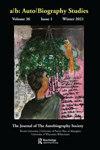Nancy Prince: Strategic (Re)mappings through Travel and Text
Q1 Arts and Humanities
引用次数: 0
Abstract
Abstract Growing up in extreme poverty in Massachusetts, Nancy Gardner Prince (1799–1859) experienced migrancy and dislocation from an early age. In 1824, she emigrated to Russia for nearly a decade, and later emigrated to Jamaica for a brief period. As an African American author who journeyed widely in the United States and abroad, Prince’s writings reveal the racial discrimination and regulation that she endured while traveling in the US, as well as the impact that such restrictions on her freedom of movement had on her conceptions of racial kinship and national belonging. This essay approaches the regulation of Black mobility as a crucial site of racial dominance, subordination, and exclusion, and theorizes that Prince’s writings strategically remap the racially uneven conditions that she experienced on her journeys to articulate a counternarrative of Black citizenship and belonging in the US. Prince not only flips the script by publicly exposing racist conveyance operators, her autobiography also forms a counterarchive that records her ancestors’ oral histories of dispossession and US patriotism. Through close readings and attention to her revisions, we see that Prince’s engagements with territorial concepts such as “country” and “place” contemplate the tensions inherent in African American identity during the antebellum nineteenth century, as they disclose the complex negotiations that shaped her travels and texts.南希·普林斯:通过旅行和文本的战略(重新)映射
南希·加德纳·普林斯(Nancy Gardner Prince, 1799-1859)在马萨诸塞州极度贫困的环境中长大,从小就经历了移民和错位。1824年,她移居俄罗斯近十年,后来又短暂移居牙买加。作为一名在美国和国外广泛旅行的非裔美国作家,普林斯的作品揭示了她在美国旅行时所遭受的种族歧视和管制,以及这种对她行动自由的限制对她的种族亲属关系和国家归属感的影响。这篇文章将黑人流动的监管作为种族统治、从属和排斥的关键场所,并认为普林斯的作品战略性地重新描绘了她在旅途中经历的种族不平等状况,以清晰地表达黑人公民身份和美国归属感的反叙事。普林斯不仅翻转了剧本,公开揭露了种族主义运输经营者,她的自传还形成了一个反档案,记录了她祖先被剥夺财产和美国爱国主义的口述历史。通过仔细阅读和关注她的修订,我们看到,普林斯对“国家”和“地方”等领土概念的接触,思考了十九世纪南北战争前非裔美国人身份中固有的紧张关系,因为它们揭示了塑造她的旅行和文本的复杂谈判。
本文章由计算机程序翻译,如有差异,请以英文原文为准。
求助全文
约1分钟内获得全文
求助全文
来源期刊

a/b: Auto/Biography Studies
Arts and Humanities-Literature and Literary Theory
CiteScore
0.80
自引率
0.00%
发文量
27
期刊介绍:
a /b: Auto/Biography Studies enjoys an international reputation for publishing the highest level of peer-reviewed scholarship in the fields of autobiography, biography, life narrative, and identity studies. a/b draws from a diverse community of global scholars to publish essays that further the scholarly discourse on historic and contemporary auto/biographical narratives. For over thirty years, the journal has pushed ongoing conversations in the field in new directions and charted an innovative path into interdisciplinary and multimodal narrative analysis. The journal accepts submissions of scholarly essays, review essays, and book reviews of critical and theoretical texts as well as proposals for special issues and essay clusters. Submissions are subject to initial appraisal by the editors, and, if found suitable for further consideration, to independent, anonymous peer review.
 求助内容:
求助内容: 应助结果提醒方式:
应助结果提醒方式:


